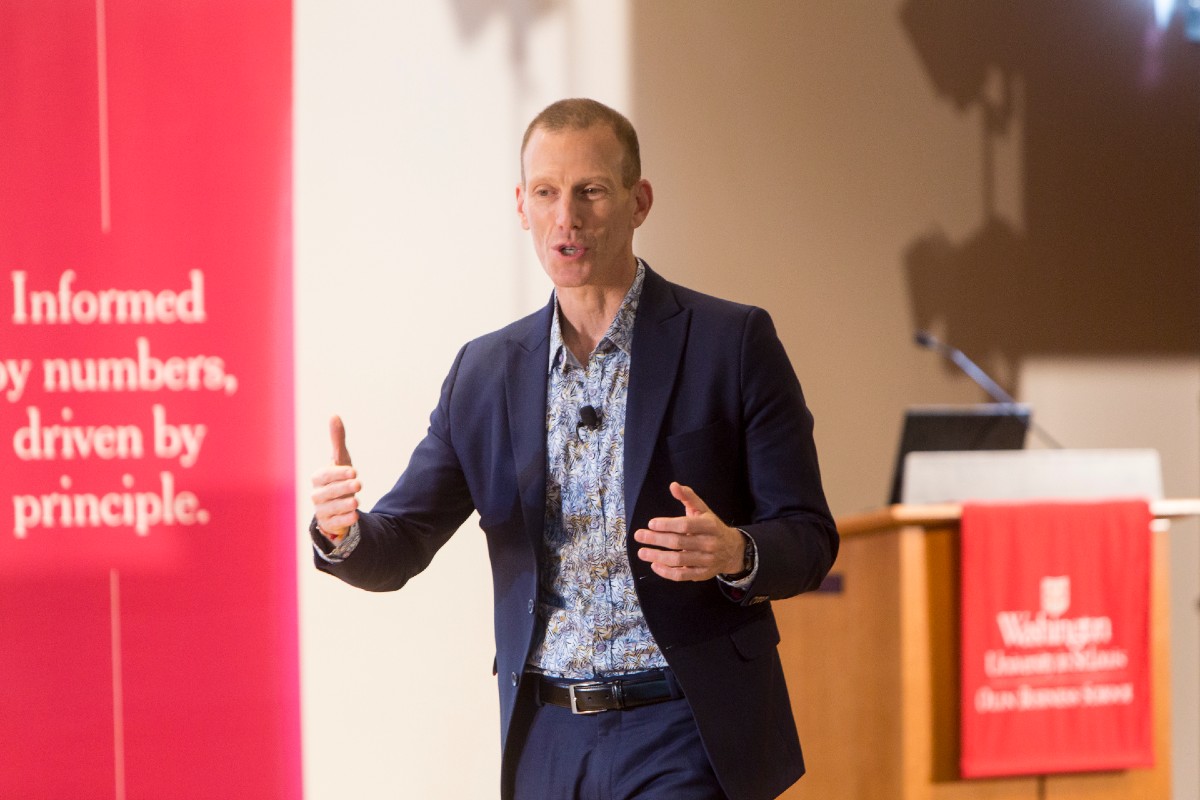Focus on ethics as data multiplies, speaker urges
- November 11, 2019
- By Jill Young Miller
- 2 minute read

Can data science be used for good? The answer is 100% yes. Can data science be used for ill? The answer is also 100% yes.
“And the difference between the best applications and the worst applications is us,” said keynote speaker Jamie Metzl at Olin’s conference November 1 on data responsibility and the ethics of analytics.
Metzl, a renowned technology futurist, kicked off the event. Olin’s Center for Analytics and Business Insights and the Bauer Leadership Center, in partnership with the school’s Leadership Perspective series, organized the conference.
Speakers also included representatives from Maritz Motivation Solutions Inc., Americas-Teradata, Bryan Cave LLP, Mastercard, Express Scripts Inc., Edward Jones and Daugherty Business Solutions.
“The challenge is that this future is coming at us much faster than most of us understand or appreciate,” Metzl said. “And the reason for that is that we are in an era of exponential change.”
Such rapid change is leading to a world where science fiction and science fact are connected, he said.
“We have to get out of our day-to-day, conservative mindsets to really be able to imagine where we are going,” Metzl said. “Because it is an exciting, crazy, frightening, new and fast-approaching world.”
‘Massive data pools’ and our values
Metzl cited the future of medicine as a prime example. The world of symptom-based medicine is shifting “to a new world of predictive medicine,” aided by human genome sequencing.
“We’re very soon moving into a world where every kid is going to have their whole genome sequenced,” Metzl said. “We’re going to have in very short order these massive data pools.”
Which brings up a lot of questions: How will we use the data? What are the applications that we think are OK? What are the applications that worry us?
The most sensitive application of new technologies will be for human reproduction, Metzl said.
“We humans are going to increasingly not conceive our children through sex, but we’re going to conceive our children through in vitro fertilization. We’re going to do it in the lab. And the reason is because taking conception outside of the human body will allow us to apply science to procreation.”
We must make sure that our best values guide the use of technology, Metzl said.
This is not a conversation about technology. It’s a conversation about ethics.
Jamie Metzl
Other speakers at the conference included:
- Jesse Wolfersberger, chief data officer at Maritz Motivation Solutions, on “Incorporating Guard Rails Around Transparency, Targeting and Tracking.”
- Bonnie Holub, managing partner at Americas-Teradata, on “The Road Ahead: Artificial Intelligence, Machine Learning, Data Analytics and Visualization.”
- Sam Garner, associate at Bryan Cave, on “Privacy Risks of Using 23andMe and AncestryDNA Services.”
The morning also featured a panel discussion on “Creating a Data Responsible Culture.” Panelists were Amit Bhagat of Amitech Solutions, Shawn Hilleary of Matercard, Chris Lehmuth of Express Scripts, Emily Spriggs of Edward Jones, and Andy Sweet of Daugherty Business Solutions.
Media inquiries
For assistance with media inquiries and to find faculty experts, please contact Washington University Marketing & Communications.
Monday–Friday, 8:30 to 5 p.m.
Sara Savat
Senior News Director, Business and Social Sciences
